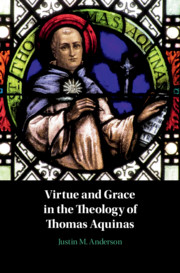Book contents
- Virtue and Grace in the Theology of Thomas Aquinas
- Virtue and Grace in the Theology of Thomas Aquinas
- Copyright page
- Epigraph
- Contents
- Acknowledgments
- Abbreviations of Aquinas’s Works
- Introduction
- Part I Virtue and the Developments in Grace
- Part II The Conditions of Virtue Simpliciter
- Part III The Conditions of Virtue Secundum Quid
- Part IV Confirmations and Conclusions
- Conclusion
- Selected Works Cited
- Index
Introduction
Published online by Cambridge University Press: 18 September 2020
- Virtue and Grace in the Theology of Thomas Aquinas
- Virtue and Grace in the Theology of Thomas Aquinas
- Copyright page
- Epigraph
- Contents
- Acknowledgments
- Abbreviations of Aquinas’s Works
- Introduction
- Part I Virtue and the Developments in Grace
- Part II The Conditions of Virtue Simpliciter
- Part III The Conditions of Virtue Secundum Quid
- Part IV Confirmations and Conclusions
- Conclusion
- Selected Works Cited
- Index
Summary
Virtue in the writings of Thomas Aquinas is inseparable from his understanding of sin, grace, and God’s presence in human life and action. The logic inherent to his account of virtue, virtue both with and without grace, requires us to speak of grace and sin. Because it pertains to the very logic of virtue to address these theological topics, it becomes impossible to treat them as mere addenda or to bracket them in favor of a supposedly complete philosophical account. This last point comes into greater relief when we acknowledge, with centuries of other readers of Aquinas, that his theology of grace underwent development throughout his writings. Yet little attention has been given to the effects this development exercises on both his understanding of virtue and the role it can take up in our moral lives. This is largely because readers of Aquinas, friends and adversaries alike, have become satisfied addressing the intersection of grace and virtue in terms of the infused and acquired virtues alone. While such a vector is certainly an interesting and demanding study, it fails to acknowledge the effects his developments in topics like operative grace, God’s influence in human action, and sin have for his account of virtue.
- Type
- Chapter
- Information
- Publisher: Cambridge University PressPrint publication year: 2020



